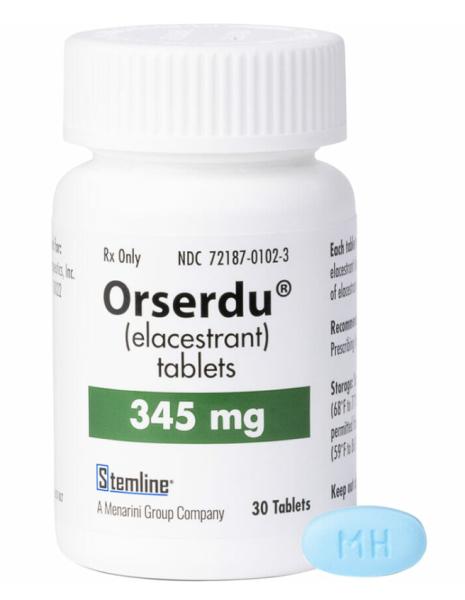Orserdu and Alcohol/Food Interactions
There is 1 alcohol/food/lifestyle interaction with Orserdu (elacestrant).
Elacestrant Food/Lifestyle
Major Food Interaction
GENERALLY AVOID: Grapefruit juice may increase the plasma concentrations of elacestrant, which is primarily metabolized by CYP450 3A4. The proposed mechanism is inhibition of CYP450 3A4-mediated first-pass metabolism in the gut wall by certain compounds present in grapefruit. Inhibition of hepatic CYP450 3A4 may also contribute. The interaction has not been studied with grapefruit juice but has been reported for other CYP450 3A4 inhibitors. When elacestrant (172 mg once daily) was administered with itraconazole, a potent CYP450 3A4 inhibitor, elacestrant peak plasma concentration (Cmax) and systemic exposure (AUC) increased by 4.4-fold and 5.3-fold, respectively. Concomitant use of fluconazole, a moderate CYP450 3A4 inhibitor, is predicted to increase elacestrant (345 mg single dose) Cmax and AUC by 1.6-fold and 2.3-fold, respectively. In general, the effect of grapefruit juice is concentration-, dose- and preparation-dependent, and can vary widely among brands. Certain preparations of grapefruit juice (e.g., high dose, double strength) have sometimes demonstrated potent inhibition of CYP450 3A4, while other preparations (e.g., low dose, single strength) have typically demonstrated moderate inhibition. Increased exposure to elacestrant may increase the risk of adverse reactions such as musculoskeletal pain, nausea, dyslipidemia, increased liver enzymes, fatigue, decreased hemoglobin, and vomiting.
Administration of elacestrant (345 mg) with a high-fat meal (800 to 1000 calories, 50% fat) increased elacestrant Cmax and AUC by 42% and 22%, respectively, compared to fasted conditions.
MANAGEMENT: It may be advisable for patients to avoid consumption of grapefruit, grapefruit juice, or supplements that contain grapefruit during treatment with elacestrant. Elacestrant should be taken with food at approximately the same time each day.
References (1)
- (2023) "Product Information. Orserdu (elacestrant)." Stemline Therapeutics
Switch to consumer interaction data
Orserdu drug interactions
There are 292 drug interactions with Orserdu (elacestrant).
Orserdu disease interactions
There is 1 disease interaction with Orserdu (elacestrant) which include:
More about Orserdu (elacestrant)
- Orserdu consumer information
- Check interactions
- Compare alternatives
- Pricing & coupons
- Drug images
- Side effects
- Dosage information
- During pregnancy
- FDA approval history
- Drug class: estrogen receptor antagonists
- En español
Related treatment guides
Drug Interaction Classification
| Highly clinically significant. Avoid combinations; the risk of the interaction outweighs the benefit. | |
| Moderately clinically significant. Usually avoid combinations; use it only under special circumstances. | |
| Minimally clinically significant. Minimize risk; assess risk and consider an alternative drug, take steps to circumvent the interaction risk and/or institute a monitoring plan. | |
| No interaction information available. |
See also:
Further information
Always consult your healthcare provider to ensure the information displayed on this page applies to your personal circumstances.


